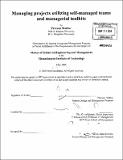Managing projects utilizing self-managed teams and managerial toolkits
Author(s)
Mathur, Praveen, S. M. Massachusetts Institute of Technology
DownloadFull printable version (12.21Mb)
Alternative title
Managing software projects utilizing self-managed teams and managerial toolkits
Other Contributors
System Design and Management Program.
Advisor
Eric A. von Hippel.
Terms of use
Metadata
Show full item recordAbstract
Project Management is an essential function in most software companies today. With increasing complexity and inter connectivity between software projects, it is not surprising that managing such large scale development projects can be expensive and extremely time consuming for the sponsoring organization. In large scale complex software projects the project manager has to ensure that enough resources are allocated to the project and foster an environment of communication and teamwork, but accomplish all this with little authority over the project team. This traditional approach to managing project relies on the skills and experience of a project manager but is fraught with pitfalls that can lead the project in the wrong direction if corrective action is not taken in a timely fashion. Any misstep during the project lifecycle due to scope creep or miscommunication can ultimately push the project to miss deadlines or be over budget. Another alternative approach to software development is using self organizing teams. Free/Open Source software development approach uses the concept of self organizing teams to collaborate at a global scale using communities of developers. The F/OSS paradigm, based on cooperation and collaboration among developers from all over the world, introduces methodologies and development models different from those usually utilized within the proprietary software industry. (cont.) In it, communities of developers and users share a common interest in a project and interact regularly with one another to share knowledge collaboratively solve a common problem. This approach reduces the overhead required in communication and coordination by sharing information with all members of the project and relies on automating some of the essential elements of the project. The thesis synthesizes the use of automated tools as it applies to the project toolkit and uses case studies to understand how F/OSS development approach can be used in organizations to reduce project's dependence on a project manager.
Description
Thesis (S.M.)--Massachusetts Institute of Technology, System Design and Management Program, 2009. Cataloged from PDF version of thesis. Includes bibliographical references (p. 77-78).
Date issued
2009Department
System Design and Management Program.Publisher
Massachusetts Institute of Technology
Keywords
System Design and Management Program.